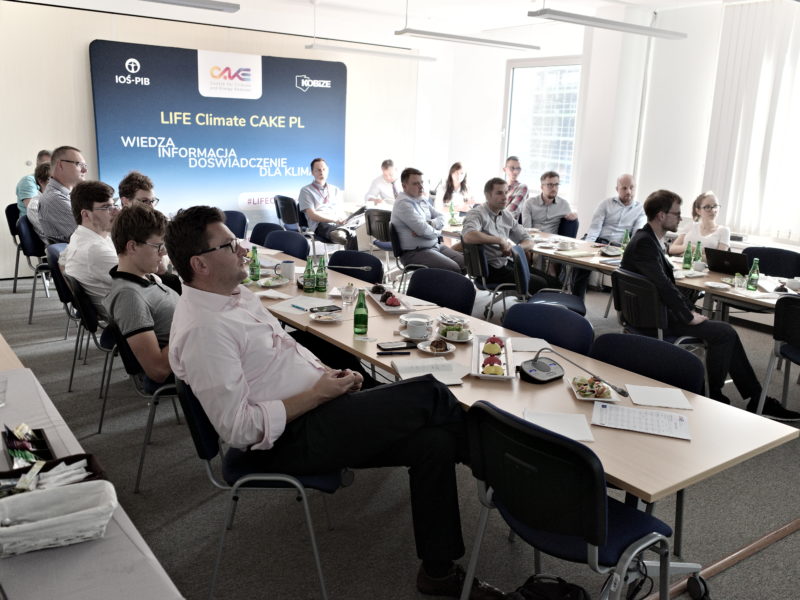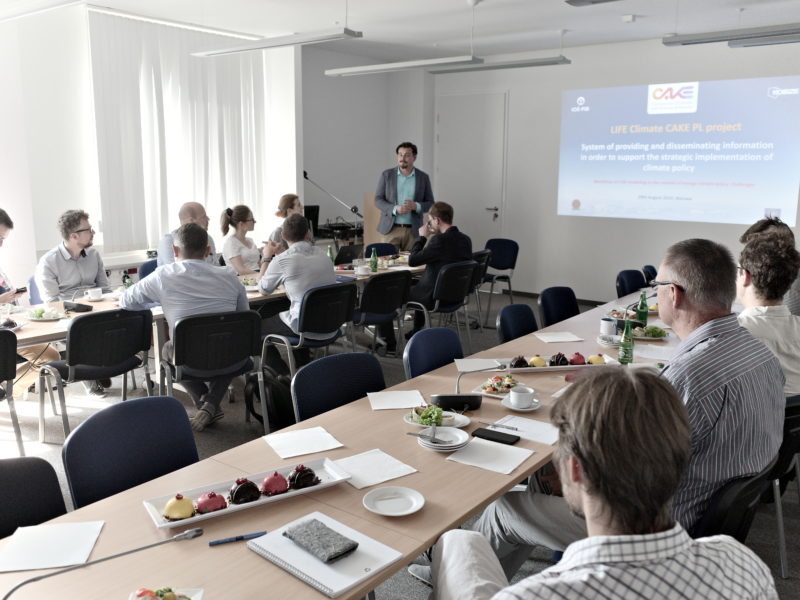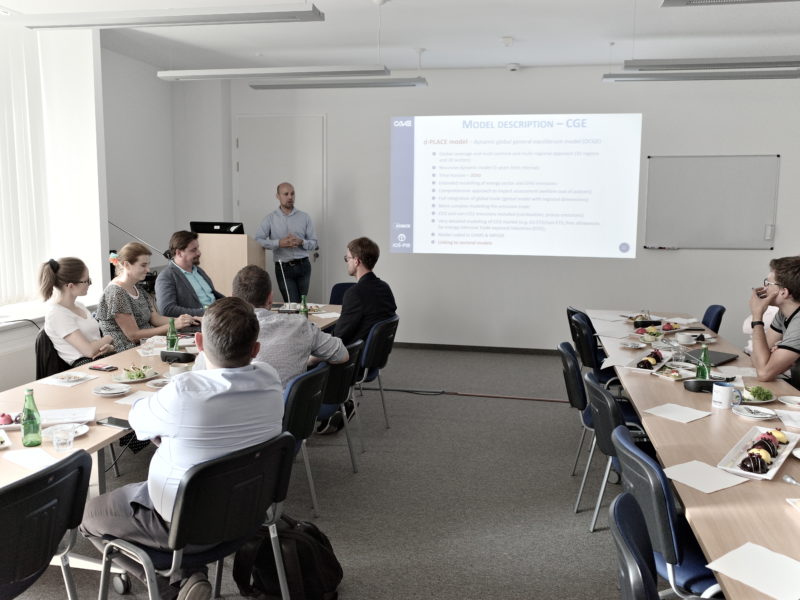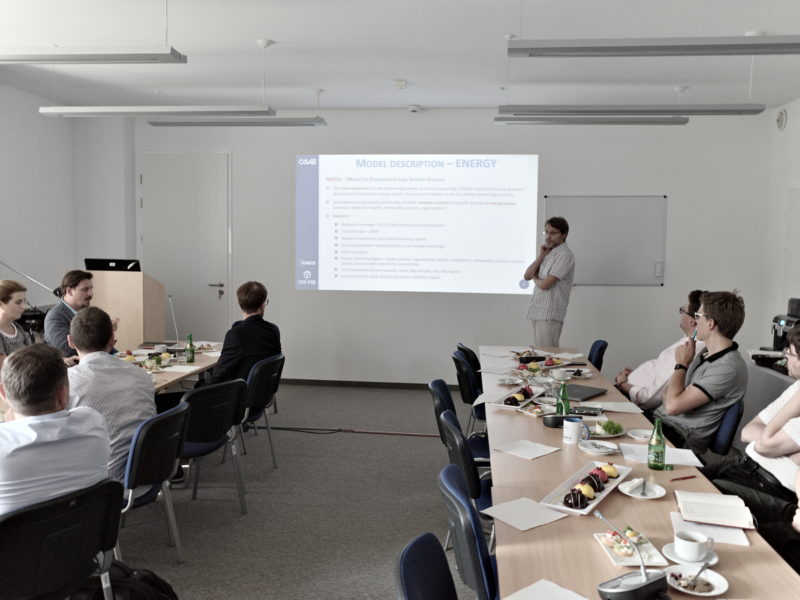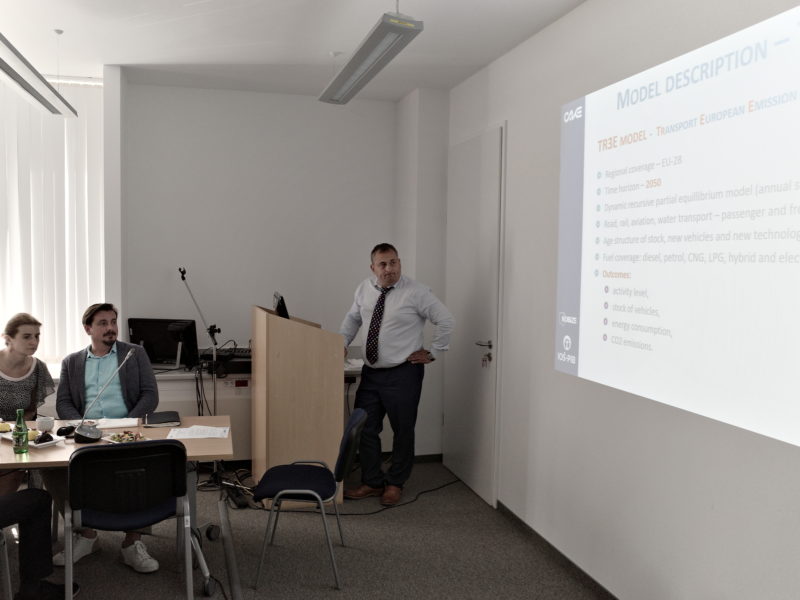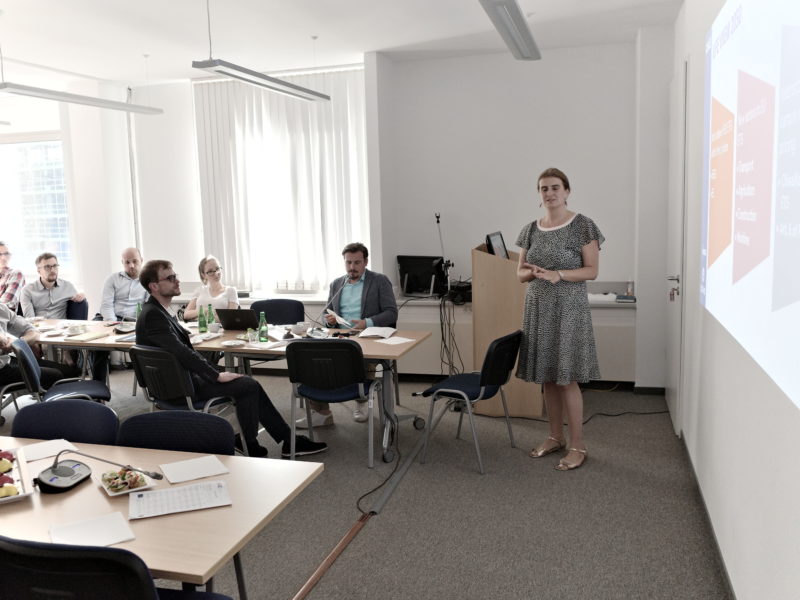Workshop on CGE modeling in the context of climate and energy policy challenges
On the 29th of August 2019 a workshop on CGE modeling in the context of climate and energy policy challenges took place in KOBiZE.
Robert Jeszke, coordinator of the LIFE Climate CAKE PL project, kicked off the meeting welcoming all guests. At the beginning he introduced, i.a. the KOBiZE tasks, the origins of CAK / CAKE, the assumptions of the LIFE Climate CAKE PL project and a model tool diagram. Then the assumptions for all models were presented in sequence:
- Jan Gąska – CGE model – d-PLACE,
- Igor Tatarewicz – energy model – MEESA,
- Wojciech Rabiega – transport model – TR3E,
- Jan Witajewski-Baltvilks – agricultural model – EPICA.
The outocmes of the analysis of the phenomenon of carbon leakage in the context of increasing the EU reduction target prepared under CAKE were presented in the resulting part. The analysis is available in PL and ENG:
 Podsumowanie raportu Ryzyko ucieczki emisji w kontekście zwiększenia celu redukcji emisji gazów cieplarnianych UE (849.6 KiB, 2,538 hits)
Podsumowanie raportu Ryzyko ucieczki emisji w kontekście zwiększenia celu redukcji emisji gazów cieplarnianych UE (849.6 KiB, 2,538 hits)
 The risk of Carbon Leakage in the context of increasing the EU Greenhouse Gas Emission reduction taget (3.2 MiB, 2,904 hits)
The risk of Carbon Leakage in the context of increasing the EU Greenhouse Gas Emission reduction taget (3.2 MiB, 2,904 hits)
In the context of this type of analysis, it should be borne in mind that the most important conclusions are of a systemic nature, showing causal links and the mechanisms behind them – emphasized Robert Jeszke. The conducted analysis indicates a problem that may occur if the rest of the world would not undertake appropriate reduction measures when the EU climate policy is tightened. Paradoxically, this can lead as analyzes shows to a negative effect by not only a decrease in the competitiveness of the EU industry, but also, even increase in global emissions. It should be emphasized that the degree of risk of carbon leakage, understood as the transfer of high-emission production, can most affect these EU Member States whose energy mix is based on fossil fuels (including Poland) and energy-intensive sectors of the economy, i.e. the steel, mineral sectors, chemical. Therefore, an important conclusions from the CAKE analysis include i.a. the need for the EU to ensure the implementation of the obligations of other countries (signatories to the Paris Agreement), support for the transfer of low-carbon technologies outside the EU, the possibility of introduction of border carbon tax and support for energy-intensive sectors in the EU. Such actions are key in order to prevent the risk of carbon leakage.
The presentation of preliminary results of the analysis of the energy mix of the EU and individual countries in the 2050 perspective made using the energy model aroused great interest of the gathered guests. Michał Lewarski discussed four scenarios at EU level:
- BASE – reduction achieved: 60% * ;
- BAU – 2050 reduction target at 80% * ;
- DEEP – 2050 reduction target of 95% * ;
- NN DEEP – 2050 reduction target of 95% * , but without the possibility of building new nuclear sources;
* Emission reduction levels compared to 2015.
The long-term analyzes of the energy sector are of great importance from the point of view of upcoming decisions on setting emission reduction targets at the EU level in the 2050 perspective and their impact on the future shape of the energy mix of individual countries, and thus the costs for their economies. The obtained results show how significant changes in the EU energy sector will have to take place in order to achieve climate neutrality.
The most important element of the workshop from the project’s point of view was the discussion and observations that the guests – experts in modeling and energy and climate policy – had to the results of work carried out under the LIFE Climate CAKE PL project. Interesting suggestions for the development of CAKE tool-kit i.a. the possibility of taking into account the increase in electricity demand in industry, new energy storage technologies, the financial market and its instruments (taxes, customs) were received. Another important conclusion of the meeting was also the indication of the need to ensure that the work performed by analysts and modelersdio would not be put away in a “drawers”, but it would constitute an element in the decision-making process at the political level.
The meeting gave an opportunity to provide an information on the progress of the LIFE project implementation and workshop activities, conferences, meetings, etc.

 Reset ustawień
Reset ustawień Kontrast
Kontrast Widok
Widok Czytelność
Czytelność Czcionka
Czcionka Znaki
Znaki Interlinia
Interlinia Słowa
Słowa Akapity
Akapity Deklaracja dostępności
Deklaracja dostępności




